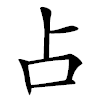占
- to divine, to tell fortunes;
- to occupy;
Etymology
Formed as a compound ideograph:
卜 (divination, augury) provides the semantic element of fortune-telling and omen-seeking;
口 (mouth) suggests vocalization or declaration.
Together, the character depicts the act of uttering a divinatory result after casting lots or performing augury.
Later, by phonetic borrowing, 占 also came to mean “to claim/occupy”, as the form resembled a flag planted in the ground, symbolizing possession. This borrowed sense is what underlies modern words like “to occupy” or “to take over.”
Semantic range:
- to divine, practice augury, tell fortunes (점치다);
- to state or declare a prediction;
- to occupy, take possession, claim (점령하다, 차지하다);
- prefix in many “점” words (店 shop, 點 dot/point, 粘 stick, etc.).
Usage in Korean
占卜 (점복) — divination, fortune-telling
占領 (점령) — occupation, seizure
占有 (점유) — possession, ownership
占星術 (점성술) — astrology
預占 (예점) — prediction, premonition
Additional notes
In ancient China, 占 was central to divination practices that shaped early governance and cosmology. Oracle bone inscriptions (甲骨文) from the Shang dynasty used 卜 and 占 for pyromancy and augury, with rulers basing decisions of war, agriculture, and ritual on these divinations.
In Confucian contexts, 占 was associated with interpreting omens in a moral framework, reflecting the harmony (or disharmony) between Heaven (天) and human affairs.
In Daoist and Buddhist thought, 占 later broadened to include astrology and esoteric methods of foretelling destiny, linking human fate with cosmic cycles.
Alternative forms
佔, often used in Taiwan/Hong Kong for “occupy,” while 占 is restricted to “divine.”
- 卜口 (YR)
- ⿱ ⺊ 口
